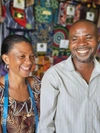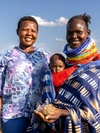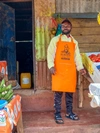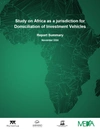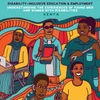Kenya
Young Africa Works in Kenya will help micro, small, and medium-sized enterprises (MSMEs) grow, unlock the potential of the agricultural sector, and use a skilled workforce that is ready to take advantage of new possibilities. These will be supported by a digital transformation plan that will create business models that are disruptive and can grow quickly.

-
Goal
Build the capabilities and resilience of young people and institutions across Kenya to enable seven million young people to access dignified and fulfilling work by 2030. Of these, 70 percent (approximately five million) will be young women.
-
Context
Over 800,000 young people join the workforce every year. However, a mix of large and small factors has made it harder for formal jobs to be created. Young people from low-income areas, especially young women, have to deal with the worst of these problems and are often pushed to take low-productivity jobs in vulnerable conditions.
To realize an ambitious agenda anchored within a singular focus on young people, Young Africa Works in Kenya will foster and deepen partnerships with and between the business sector, civil society, academia, and government, among others, to improve job creation outcomes.
-
Approach
Young Africa Works in Kenya is built on a thorough root-cause analysis of the systemic barriers that keep young women and men from getting the chances they deserve. Taking into account the Government of Kenya’s goals and plans, such as Vision 2030, it outlines a comprehensive set of investments that aim to change national systems (including social, economic, and technological systems), mindsets, institutions, and policies in order to create dignified and fulfilling jobs for young women and men and help their families and communities as a result.
-
Priority
Micro, small, and medium-sized enterprises (MSMEs), agriculture, workforce development (education and skills), and the digital economy.
Programs in Kenya
The Foundation’s Kenya office is located in Nairobi and currently supports over 50 active partnerships in the country. Focus sectors for Young Africa Works in Kenya include agriculture, the digital economy, micro, small, and medium-sized enterprises (MSMEs), and workforce development.
Research from Kenya
View All-
Preparing For AI In The BPO And ITES Sector In Africa
Digital Uganda, Nigeria, Kenya, Rwanda, South Africa -
Study on Africa as a Jurisdiction for Domiciliation of Investment Vehicles
Ghana, Ethiopia, Uganda, Kenya, Togo, Rwanda, Senegal, Morocco, South Africa, Côte d’Ivoire, Nigeria -
Disability-Inclusive Education and Employment: Understanding the Experiences of Young Men and Women with Disabilities - KENYA
Disability Inclusion Kenya -
Platform Livelihoods For Kenyan Youth With Disabilities: A Survey And Qualitative Study
Disability Inclusion Kenya
Latest from Kenya
-
Mastercard Foundation And UNHCR Launch Historic Partnership To Transform Education And Livelihoods For More Than 500,000 Refugees And Displaced Youth In Africa
-
40% Of Tasks In Africa’s Growing Tech Outsourcing Sector May Be Affected By AI By 2030
-
Mastercard Foundation Scholars Impress At The 2024 Resolution Social Venture Challenge
-
Mastercard Foundation President and CEO, Reeta Roy, Announces Decision to Transition from the Foundation
-
New Study Reveals Domiciliation as Key to Mobilizing Capital Flows in Africa
-
iHUB Announces Call for Applications for Third Cohort of Mastercard Foundation EdTech Fellowship in Kenya Following Success of Second Cohort
-
The Investment Case For Africa’s Displaced Women Entrepreneurs
-
Tapping Into Africa’s Refugees: Economic Opportunity Hiding In Plain Sight
-
From Refugee Camp to AI Creator: The Untold Story of Kakuma Girls
-
Request For Expression Of Interest: Youth Enabling Oganization To Support In The Recruitment And Management Of Youth-Led Organizations That Will Accelerate Work Opportunities For Young People In Kenya
-
Systematizing EdTech Integration Into The Curriculum
-
Underwriting Foundational Infrastructure Through Creative Use Of EdTech Resources
